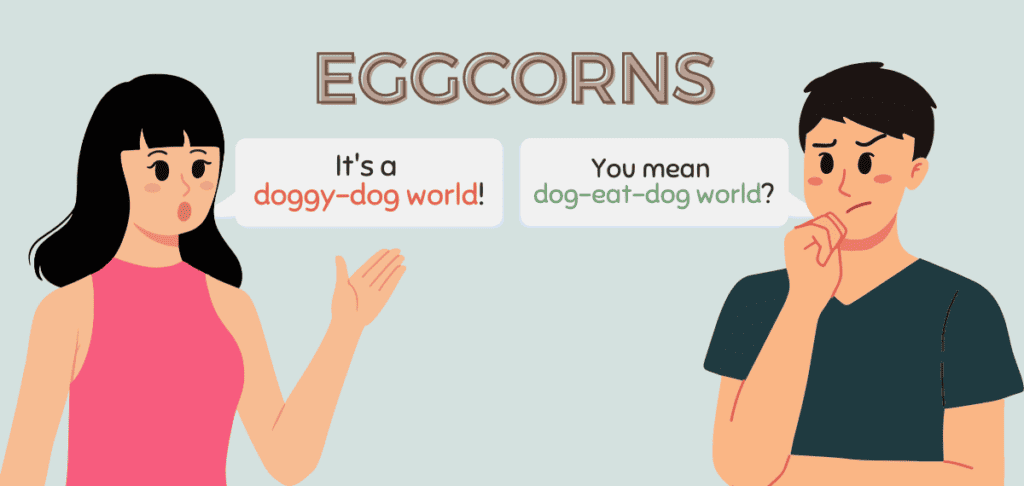I’m venturing into a super fascinating linguistic phenomenon: eggcorns. Want to come along? Before you start wondering if we will discuss some exotic corn variety or a scrambled egg recipe, let me clarify. Eggcorns are a delightful, almost always hilarious, feature of our language. But you need to understand what they truly are and how to spot them.
What Is an Eggcorn?

An eggcorn is a misheard or misinterpreted phrase, word, or saying that keeps a similar sound to the original but takes on a new (and often oddly appropriate) meaning. It’s like if you heard someone talk about an eggcorn when they meant acorn. Congratulations, you’ve just spotted an eggcorn!
Malapropism vs. Eggcorn
To understand eggcorns better, it’s important to distinguish them from their cousins, malapropisms. Malapropisms also involve incorrect usage of a word that sounds similar to the correct one. However, the twist is the mistake leads to a nonsensical or absurd result.
For example, you might hear someone might say illiterate when they mean obliterate. That’s a malapropism. Eggcorns are similar and make a strange sort of sense, like ex-patriot instead of expatriate. You see, an expatriate might be a former patriot!
List of Eggcorns
Here are some classic eggcorns that’ll tickle your language-loving funny bone:
“Old-timer’s disease” for “Alzheimer’s disease”
This eggcorn does kind of make sense since Alzheimer’s primarily affects older people.
“Mute point” instead of “moot point”
Maybe the point doesn’t have a voice?
“Preying mantis” instead of “praying mantis”
Well, they are pretty predatory insects!
“For all intensive purposes” rather than “for all intents and purposes”
Because sometimes our purposes are intensive, aren’t they?
“Hunger pains” instead of “hunger pangs”
Hunger can indeed be painful!
“Take it for granite” instead of “take it for granted”
As much as we appreciate the durability of granite, this isn’t quite right.
“Curve your enthusiasm” instead of “curb your enthusiasm”
While curving your enthusiasm could involve some creative, emotional gymnastics, it’s not the phrase you’re looking for.
“Escape goat” instead of “scapegoat”
An escape goat sounds like a fantastic accomplice in a heist movie, but it’s not the correct term.
“Card shark” instead of “card sharp”
Sharks are definitely more intimidating, but in the world of card games, it’s actually “sharp.”
“Tow the line” instead of “toe the line”
This eggcorn is so widespread most people don’t realize it’s a misinterpretation. You’re not hauling anything; you’re keeping your toes right up against a boundary line!
“Doggy-dog world” vs. “dog-eat-dog world”
Doggy-dog definitely paints a nicer picture, but it’s not right.
Examples of Eggcorn in Use

Want to see some eggcorns in action? Here you go:
- We need to nip it in the butt before it gets out of hand. (It’s actually “nip it in the bud.”)
- She gave me free range to make my own decisions. (The real phrase is “free rein.”)
- I need to flush out my ideas before presenting them. (It should be “flesh out.”)
- Let’s get down to the nitty-gritty and cut through the old wise tales. (It should be “old wives’ tales.”)
The Etymology of the Term Eggcorns
Geoffrey Pullum, a linguist, is credited with coining the term eggcorn in 2003. The term was born out of an internet post where a woman mistakenly referred to acorns as eggcorns. This unique case of a misheard or misinterpreted word gave rise to the term eggcorn. It serves as an intriguing example of language and how it can evolve through such linguistic phenomena. It’s quite fascinating, almost like linguistic inception, wouldn’t you agree?
Sign Off
Language is nothing if not endlessly amusing and fascinating. So the next time you hear someone talk about “damp squid” instead of “damp squib,” you’ll know you’ve stumbled upon an eggcorn. And who knows, you might even start finding your own eggcorn!
Remember, whenever you stumble upon an intriguing phrase or a curious language phenomenon, just swing by our site. I promise we’re your one-stop destination for all things language-related
